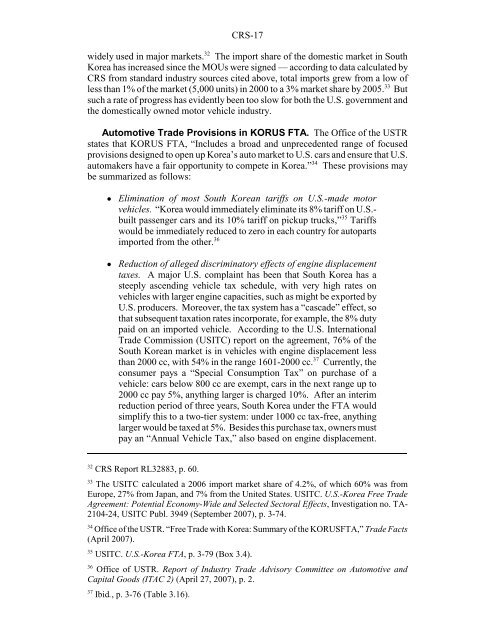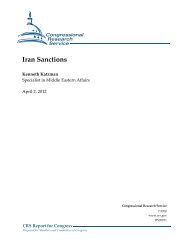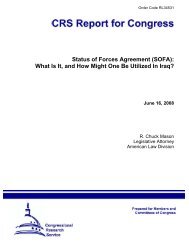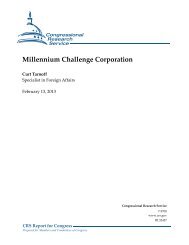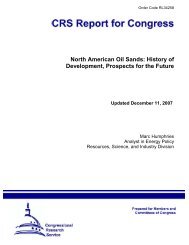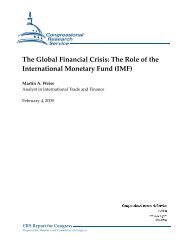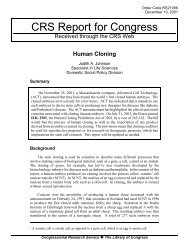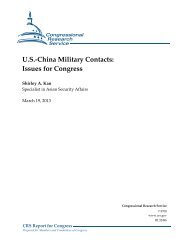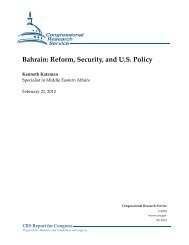The Proposed U.S.-South Korea Free Trade Agreement (KORUS ...
The Proposed U.S.-South Korea Free Trade Agreement (KORUS ...
The Proposed U.S.-South Korea Free Trade Agreement (KORUS ...
- TAGS
- korea
- fpc.state.gov
Create successful ePaper yourself
Turn your PDF publications into a flip-book with our unique Google optimized e-Paper software.
32 CRS Report RL32883, p. 60.<br />
CRS-17<br />
widely used in major markets. 32 <strong>The</strong> import share of the domestic market in <strong>South</strong><br />
<strong>Korea</strong> has increased since the MOUs were signed — according to data calculated by<br />
CRS from standard industry sources cited above, total imports grew from a low of<br />
less than 1% of the market (5,000 units) in 2000 to a 3% market share by 2005. 33 But<br />
such a rate of progress has evidently been too slow for both the U.S. government and<br />
the domestically owned motor vehicle industry.<br />
Automotive <strong>Trade</strong> Provisions in <strong>KORUS</strong> FTA. <strong>The</strong> Office of the USTR<br />
states that <strong>KORUS</strong> FTA, “Includes a broad and unprecedented range of focused<br />
provisions designed to open up <strong>Korea</strong>’s auto market to U.S. cars and ensure that U.S.<br />
automakers have a fair opportunity to compete in <strong>Korea</strong>.” 34 <strong>The</strong>se provisions may<br />
be summarized as follows:<br />
! Elimination of most <strong>South</strong> <strong>Korea</strong>n tariffs on U.S.-made motor<br />
vehicles. “<strong>Korea</strong> would immediately eliminate its 8% tariff on U.S.built<br />
passenger cars and its 10% tariff on pickup trucks,” 35 Tariffs<br />
would be immediately reduced to zero in each country for autoparts<br />
imported from the other. 36<br />
! Reduction of alleged discriminatory effects of engine displacement<br />
taxes. A major U.S. complaint has been that <strong>South</strong> <strong>Korea</strong> has a<br />
steeply ascending vehicle tax schedule, with very high rates on<br />
vehicles with larger engine capacities, such as might be exported by<br />
U.S. producers. Moreover, the tax system has a “cascade” effect, so<br />
that subsequent taxation rates incorporate, for example, the 8% duty<br />
paid on an imported vehicle. According to the U.S. International<br />
<strong>Trade</strong> Commission (USITC) report on the agreement, 76% of the<br />
<strong>South</strong> <strong>Korea</strong>n market is in vehicles with engine displacement less<br />
than 2000 cc, with 54% in the range 1601-2000 cc. 37 Currently, the<br />
consumer pays a “Special Consumption Tax” on purchase of a<br />
vehicle: cars below 800 cc are exempt, cars in the next range up to<br />
2000 cc pay 5%, anything larger is charged 10%. After an interim<br />
reduction period of three years, <strong>South</strong> <strong>Korea</strong> under the FTA would<br />
simplify this to a two-tier system: under 1000 cc tax-free, anything<br />
larger would be taxed at 5%. Besides this purchase tax, owners must<br />
pay an “Annual Vehicle Tax,” also based on engine displacement.<br />
33 <strong>The</strong> USITC calculated a 2006 import market share of 4.2%, of which 60% was from<br />
Europe, 27% from Japan, and 7% from the United States. USITC. U.S.-<strong>Korea</strong> <strong>Free</strong> <strong>Trade</strong><br />
<strong>Agreement</strong>: Potential Economy-Wide and Selected Sectoral Effects, Investigation no. TA-<br />
2104-24, USITC Publ. 3949 (September 2007), p. 3-74.<br />
34 Office of the USTR. “<strong>Free</strong> <strong>Trade</strong> with <strong>Korea</strong>: Summary of the <strong>KORUS</strong>FTA,” <strong>Trade</strong> Facts<br />
(April 2007).<br />
35 USITC. U.S.-<strong>Korea</strong> FTA, p. 3-79 (Box 3.4).<br />
36 Office of USTR. Report of Industry <strong>Trade</strong> Advisory Committee on Automotive and<br />
Capital Goods (ITAC 2) (April 27, 2007), p. 2.<br />
37 Ibid., p. 3-76 (Table 3.16).


